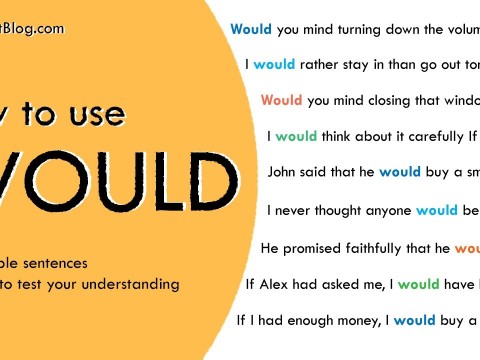重要
would
/wʊd/📚 41 5中考高考You use would when you are saying what someone believed, hoped, or expected to happen or be the case. 会 (表示相信或期待)
verb [情态动词]将,将会(will 的过去式,用于转述);会...;会,就(表示预期或设想);才会,就会(说明动机);想(表示某人想要某物或想做某事);就(不),偏(不);请…好吗?(表示客气地请求别人做某事);要不要…?;过去老是,过去常常;总是,爱(带出一贯的行为);<文>但愿…(表示强烈的愿望);也许,大概(表示推测或希望);肯定,应该
You use would, or would have with a past participle, to indicate that you are assuming or guessing that something is true.
一定 (表示假设或猜测) Would he always be like this? 他会总像这样吗?
- would 出现在下面的课文中(提供视频、音频及笔记等可系统性学习)
- Lesson 135&136 The latest report
- Lesson 139&140 Is that you, John?
- Lesson 7 Too late
- Lesson 9 A cold welcome
- Lesson 15 Good news
- Lesson 23 A new house
单词造句:
- 网友用“Would”造句精选
- They said they would give the police their full cooperation. 他们说他们愿意同警方通力合作。
- He wouldn't say where he had picked up the information. 他不愿意说出他是在哪里得到这个消息的。
- He kicked, pushed, and hurled his shoulder at the door. It wouldn't open. 他又踢又推,还用肩膀撞门。它就是不开。
- She asked me what I would like to do and mentioned a particular job. 她问我想做什么,而且提到了一份特别的工作。
- Ideally, she would love to become pregnant again. 按理想来说,她想要再次怀孕。
- Do you think it would be all right if I smoked? 你觉得我可以吸烟吗?
- Would you like to stay? 你想留下来吗?
- Would you do me a favour and get rid of this letter I've just received? 你能帮我个忙把我刚收到的这封信处理掉吗?
